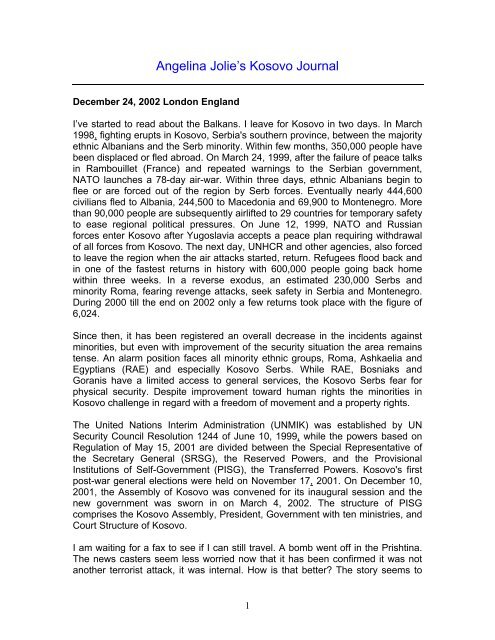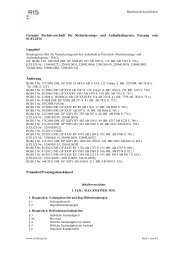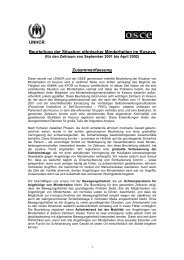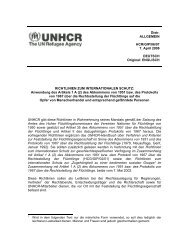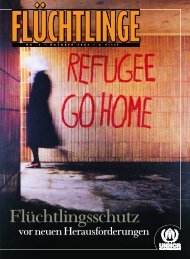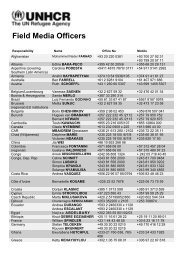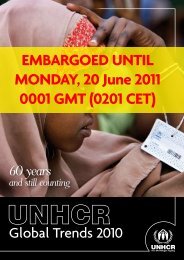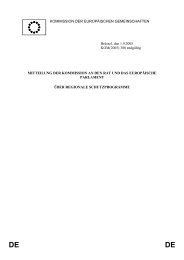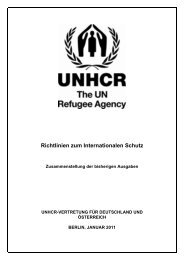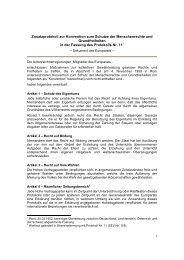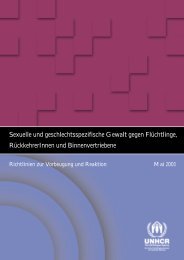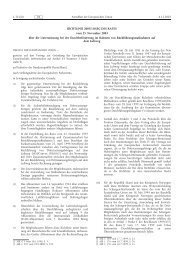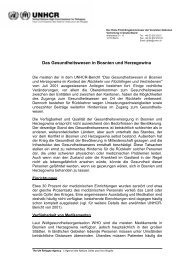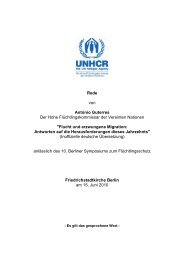You also want an ePaper? Increase the reach of your titles
YUMPU automatically turns print PDFs into web optimized ePapers that Google loves.
<strong>Angelina</strong> Jolie’s <strong>Kosovo</strong> <strong>Journal</strong><br />
December 24, 2002 London England<br />
I’ve started to read about the Balkans. I leave for <strong>Kosovo</strong> in two days. In March<br />
1998, fighting erupts in <strong>Kosovo</strong>, Serbia's southern province, between the majority<br />
ethnic Albanians and the Serb minority. Within few months, 350,000 people have<br />
been displaced or fled abroad. On March 24, 1999, after the failure of peace talks<br />
in Rambouillet (France) and repeated warnings to the Serbian government,<br />
NATO launches a 78-day air-war. Within three days, ethnic Albanians begin to<br />
flee or are forced out of the region by Serb forces. Eventually nearly 444,600<br />
civilians fled to Albania, 244,500 to Macedonia and 69,900 to Montenegro. More<br />
than 90,000 people are subsequently airlifted to 29 countries for temporary safety<br />
to ease regional political pressures. On June 12, 1999, NATO and Russian<br />
forces enter <strong>Kosovo</strong> after Yugoslavia accepts a peace plan requiring withdrawal<br />
of all forces from <strong>Kosovo</strong>. The next day, <strong>UNHCR</strong> and other agencies, also forced<br />
to leave the region when the air attacks started, return. Refugees flood back and<br />
in one of the fastest returns in history with 600,000 people going back home<br />
within three weeks. In a reverse exodus, an estimated 230,000 Serbs and<br />
minority Roma, fearing revenge attacks, seek safety in Serbia and Montenegro.<br />
During 2000 till the end on 2002 only a few returns took place with the figure of<br />
6,024.<br />
Since then, it has been registered an overall decrease in the incidents against<br />
minorities, but even with improvement of the security situation the area remains<br />
tense. An alarm position faces all minority ethnic groups, Roma, Ashkaelia and<br />
Egyptians (RAE) and especially <strong>Kosovo</strong> Serbs. While RAE, Bosniaks and<br />
Goranis have a limited access to general services, the <strong>Kosovo</strong> Serbs fear for<br />
physical security. Despite improvement toward human rights the minorities in<br />
<strong>Kosovo</strong> challenge in regard with a freedom of movement and a property rights.<br />
The United Nations Interim Administration (UNMIK) was established by UN<br />
Security Council Resolution 1244 of June 10, 1999, while the powers based on<br />
Regulation of May 15, 2001 are divided between the Special Representative of<br />
the Secretary General (SRSG), the Reserved Powers, and the Provisional<br />
Institutions of Self-Government (PISG), the Transferred Powers. <strong>Kosovo</strong>'s first<br />
post-war general elections were held on November 17, 2001. On December 10,<br />
2001, the Assembly of <strong>Kosovo</strong> was convened for its inaugural session and the<br />
new government was sworn in on March 4, 2002. The structure of PISG<br />
comprises the <strong>Kosovo</strong> Assembly, President, Government with ten ministries, and<br />
Court Structure of <strong>Kosovo</strong>.<br />
I am waiting for a fax to see if I can still travel. A bomb went off in the Prishtina.<br />
The news casters seem less worried now that it has been confirmed it was not<br />
another terrorist attack, it was internal. How is that better The story seems to<br />
1
quickly fade. It is not connected to most of the big headlines. It was simply<br />
internal so seems not for the to be concerned with. I am learning more new<br />
things all the time, but this struck me. Since the end of World War II, there have<br />
been over 150 wars, almost all in the developing world, with causalities totaling<br />
more than 30 million. Currently there are about 30 civil wars and local conflicts<br />
taking place in various parts of the world. In the brutal conflict between the<br />
Russians military and Chechen separatists, many human rights abuses have<br />
occurred, including systematic clearance and intimidation of Chechen villages.<br />
According of Amnesty International, there were up to 160,000 people in ‘refugee’<br />
camps in and around Chechnya in late 2001. Many ethnic Chechens are refused<br />
IDP status and get no help from authorities.<br />
It was reported, know no one was killed but 30 were injured. I worry about Mimi.<br />
(Marie-Noëlle, a friend I first met when she was working for <strong>UNHCR</strong> in Cambodia<br />
and Thailand.) She was posted in <strong>Kosovo</strong> six months ago. I finally get her on the<br />
phone. We talk about the days we will spend and what we will be doing. I don’t<br />
mention the bombing.<br />
I can’t help but notice as I write how luxurious this room I am in is. How<br />
pampered I am here. I am staying in a hotel for the weekend. They even put up a<br />
little Christmas tree and near it a little bear for my son. Room service comes<br />
under a silver dome, with a red rose and white linen. How can we live so<br />
drastically different in this world Here there is no lack of electricity or water. In<br />
fact, I realize as I write that every light is on in this room is on and of course, I<br />
feel stupid.<br />
December 28, 2002<br />
I dropped Maddox off at our home with a nanny early this morning. I can’t stand<br />
to hear him cry but I know he will be alright. Safe and warm at home. I’m sure<br />
when he’s older he will understand. Still I found it very hard to finish packing<br />
hearing him in the other room.<br />
Inside the airport. As I walk up to my gate I don’t know what I am expecting to<br />
see, but as I sit here I am surrounded by some men and women in business<br />
suits. They are very healthy and good looking people. Europeans. Something<br />
stylish and cool about them. Not the pictures I have seen in the news or in the<br />
papers where they seem so different and far away.<br />
Upon arrival, out of the windows of the plane I see military bases and large UN<br />
tents. Mimi and I realize that it has been a year and half since the last time we<br />
saw each other, although it feels like yesterday. These places do that to<br />
friendships.<br />
2
I am received also by Anki, <strong>UNHCR</strong> Deputy Chief of Mission, Misko and Keli<br />
from Field Office Prishtina. Getting into a car I am asked to sit not on the left side<br />
but the right side back of the UN vehicle. Not behind the driver.<br />
We go directly to the village of Dobrajae Vogal/Mala Dobraja. This area is mostly<br />
Albanians, some Ashkaelia. In 1991 Serbs expelled Albanians from their jobs,<br />
some Ashkaelia took the jobs. It is one of the reasons for the anger between<br />
Albanians and Ashkaelia. We are going to visit with the first Ashkaelia to return.<br />
This group did not take jobs they are peasants but still they are Ashkaelia.<br />
Expelled in 1999. These four families returned only 2 days ago. <strong>UNHCR</strong> has to<br />
speak with local politicians and community to let minorities come back. Possibility<br />
of violence is anticipated. This family cleaned out a well for water, and the next<br />
morning they found a dead dog in it.<br />
We drive past a Russians military base. We are inside a mountain range (mostly<br />
dirt). There are chunks of icy snow from the night before that the sun has not yet<br />
melted. Today is a very hazy sunny day out the window. Brick buildings half<br />
bombed out. Plastic sheeting for windows as we ‘re driving into flat farmland.<br />
Misko says “Sometimes it seems hopeless. A lot of work sees little results but if<br />
one family is integrated then it will move more quickly. This situation is very<br />
frustrating. You have to believe that small steps lead somewhere. We have to<br />
think hard to make sure those who remained in the village benefit from projects<br />
as well. If we rebuild houses for returnees, we also have to rebuild houses for the<br />
local people, to keep the peace. Everyone is poor and everyone is in need.<br />
We stop to get out and meet a very sweet man. It is very muddy farmland so we<br />
take off our shoes. There are four more men inside. I realize that I am meeting<br />
with Albanians to speak of the Ashkaelia that have returned. Everything is<br />
translated. Their language sounds beautiful and ancient. “During the war we<br />
were unable to leave.” “Would you have gone if you had the chance,” I ask. “No<br />
destination - just to leave because there were so many murders. Just a safe<br />
place until the war is over. He continues and before it is translated I don’t know<br />
what he is saying but his voice, his tone is getting very passionate and I hear<br />
“Slobodan Milosevic”. It is translated “The minorities did join Milosevic’s Serbs.<br />
Not all, but we know which ones. There is hate. The international community has<br />
to understand that we know we must learn to live together but it is hard not to feel<br />
anger”. The Albanian man refers to the return project as “our” return project. A<br />
<strong>UNHCR</strong> staff thanks him. It is important that they see it this way. Everyone is<br />
working together to help rebuild the country.<br />
(Jeans with many patches) I notice a mother of a girl come around the corner to<br />
take her. Moments later a man that must be her grandfather walks by. They all<br />
live together... I ask what their trade was. “We worked in the mine. Many people<br />
were fired before the war. Now it is closed”. They all worked in magnesium<br />
mines. They were all fired when the mine was closed and it will not be re-opened.<br />
3
Suddenly there is a discussion and a light that is suddenly turned on. A small<br />
rejoice, “Power is back on.” Another man begins to speak. He has beautiful blue<br />
eyes. Rubbing his hands together. They are the hands of a farmer. “We stayedwe<br />
had to witness to many massacres now war is over and we try. We don’t have<br />
proper roads. We don’t have schools in the villages. As for the minorities, we feel<br />
that all the families that were not involved in the murders may return now”.<br />
I wonder how <strong>UNHCR</strong> and other agencies will be able to prove the innocence of<br />
individual families. “We are aware that without return of minorities, <strong>Kosovo</strong> can<br />
not progress. We know it is important. The problem here is almost everybody is<br />
unemployed. We are very poor. That is the problem we are facing. We cannot<br />
rely on aid forever.”<br />
I see more people walk by. How many people are in this house “18.” Some are<br />
abroad, which is good. One has a job in Germany and he sends money to help<br />
support. I am told they also have a handicap son who is in the other room. It is<br />
not translated so he can not hear. So I assume it is not something to discuss.<br />
As we walk out, I see him standing by the door. Hands twisted together. Big<br />
curious eyes. What it must have been like for him during all the bombing and<br />
fighting, or for his parents to calm him trying to explain.<br />
The air is so clear it is very cold. You realized it after a while, and wonder how<br />
they live in it. There is no real source of heat. Most windows are broken and<br />
many of the houses have no roofs.<br />
We visit returnees, the Ashkaelia. We walk over bits of tile and rubble mixed in<br />
with mud. Two brothers and seven children... I shake a man’s hand. He is very<br />
muddy from work, so he offers a wrist. He is very cold from working outside. We<br />
walk into the house not much of it is finished but they seem VERY happy to have<br />
it. “What was it like for you in the camp” I ask. “It would have better to have<br />
been dead” he said. I ask the little girl if she was happy to be back, “Yes Very!” I<br />
keep hearing planes as we talk, not normal plane sounds. Later I see out the<br />
window it is a big military aircraft flying low.<br />
<strong>UNHCR</strong> has to make sure now the children will be accepted and that the walk to<br />
school is safe. As we talk there is a little wood burning stove and the younger<br />
woman and the pregnant wife take turns spinning the pan around. I notice how<br />
quiet the children are. They seem to know that there is very little they can ask<br />
their parents for. And certainly very little to do or play with. So they sit and they<br />
listen... And occasionally they do smile. They don’t seem to know how much they<br />
are missing. The man starts to ask the <strong>UNHCR</strong> officers I am with, for a truck filled<br />
with gravel. “I have has an old vehicle”, he says, “and my wife is going to go into<br />
labor any day now. I’m afraid. Our car will not move in the mud.”<br />
4
Another man walks in. The life on his faces is so deep. “Before the war we had<br />
cows, now we have no milk.” They have a well but they found out the water is<br />
undrinkable. They put chlorine but tested again it is still not drinkable. “We have a<br />
small baby and no formula. We need a cow.” The <strong>UNHCR</strong> staff say that they will<br />
see what they can do.<br />
These people have seen everything and they are still holding on. They are<br />
hungry. Their eyes are so expressive so clear. “We have to find seeds and tools,<br />
but still, even then it will be a year before we can feed ourselves. Now outside<br />
there is deep mud so what can we do” They are so desperate. The old man<br />
takes off his black cap and a gestures begging. As we walk out I can hear the<br />
frustration in the <strong>UNHCR</strong> staff. “We are trying to get them as much as we can,<br />
there is so much they need. Only so much money is in the budget, there are so<br />
many families.” Nothing is simple. For example, it is explained to me if they get<br />
them a cow, they would have to get the cow for others with different ethnic<br />
backgrounds as well, or there would be a fight.<br />
Anki points out the window to a mountain range “In 1998 we heard that villages<br />
were attacked, and we came looking for uprooted families.” I look at this sweet<br />
little woman and try to imagine her in the middle of war. I am beginning to<br />
understand how much more human beings are capable of. I wonder what I am<br />
capable of. I read somewhere once “very few people are strong enough for what<br />
they really know.”<br />
I finally asked about the bomb the one, I heard about on the news before I came.<br />
It seems it was mafia, a car bomb. As we drive I see WFP signs in little brick<br />
buildings surrounded by a spiral barbed wire. There is something very comforting<br />
about it. Here is a place where people are trying to overcome tremendous<br />
hardships and with them groups from around the world gathered together to try<br />
and help.<br />
Prishtina<br />
Inside <strong>UNHCR</strong> office: a meeting with female de-miners. I had heard about this<br />
group before I came. They became one of the best de-mining teams. The only all<br />
female platoon (30 people) in the world. They were working with Norwegian<br />
Peoples Aid, these four women. I ask how they got involved<br />
“After the war we came back, no jobs, everything destroyed. At first there were<br />
very few women. We did well. Now there are a lot of women. Between Albania<br />
and <strong>Kosovo</strong> on the border there are lots of mines. There are no maps.<br />
One girl is working now with Handicap International. “We are happy when we find<br />
a mine, because you didn’t step on it, you found it”. One of the girls was<br />
wounded in the field. “On May 25, 2000.” She remembers the date clearly. She<br />
now wears a prosthetic leg. I would have never guessed she hides it so well<br />
5
under her jeans and boots. What were you doing before the war, I ask She<br />
answers “I went to the University, and I was a shop keeper.”<br />
One girl starting de-mining at 15 because her father was shot during the war and<br />
no one in her family was working. She lied and said she was 18. I ask another<br />
woman if she has any children. “No” she says. “But we did have mothers in the<br />
de-mining team, even one grandmother. Mothers especially want to de-mine.<br />
They need a job even more because they have mouths to feed, and they don’t<br />
want their children to step on a mine.” She tells me she also had to deal with<br />
cluster bombs. Suddenly I am writing in the dark. Someone says, “Welcome to<br />
<strong>Kosovo</strong>.”<br />
Anki’s Home<br />
<strong>UNHCR</strong> staff dinner. We are 45 minutes early so I have some time to wash up<br />
and rest. First thing I notice is the generators. I am shown to my room and then<br />
the bathroom. Anki checks the large boiler and the meter. “Good, we have some<br />
warm water and should have water pressure if you want a quick shower.” I say<br />
no, not because I’m being polite and don’t want to waste water, (which I don’t)<br />
but really I’m too cold. I unpack stickers, finger-paints, hair-bands and stuffed<br />
animals. I wish I had remembered I had this earlier, I could have given some to<br />
the kids. I think, maybe I will drop them by on the way back to the airport, but the<br />
families asked for milk. They need a cow. I can’t come back with toys with stupid<br />
stickers. Maybe I can bring food, something. I will ask Mimi.<br />
Dinner<br />
All the lights are out, so we set out candles. I meet a few of the local and<br />
international staff from different offices in <strong>Kosovo</strong>. <strong>UNHCR</strong> staff. Naturally we<br />
start to speak about the generators. The electricity problem. How there was<br />
money stolen. How even during the bombing they had better electricity. There is<br />
something very special about a group of friends gathering together to talk. No<br />
television, no radio no distractions.<br />
“The first days of the air raids was the scariest. We didn’t know how they were<br />
going to attack.” Sunnah, another <strong>UNHCR</strong> staff arrives, and brings in flowers.<br />
Four large yellow orange and pink flowers that look like daisies. This leads to a<br />
long discussion as most people in the room haven’t seen flowers for a very long<br />
time. “Where did you get them” “Were they flown in” “No there is a small glass<br />
house behind a building and they are starting to grow them there.” “How do they<br />
keep them warm enough” “Maybe woodburning heater.” The conversation goes<br />
on for a while, and I realize I have never taken so much notice of a few flowers.<br />
What it means for things to be growing. How flowers can bloom in a frozen,<br />
bombed out country. And how much that can mean<br />
6
Anki who cooked the dinner is Finnish, and because of the diversity of <strong>UNHCR</strong><br />
staff it is common for a person to cook something traditional from their country.<br />
“This is tomato, this is pickled peppers from a neighbor who heard I was having<br />
guests and this is reindeer.” Maybe it’s because it’s close to Christmas time but I<br />
suddenly saw images from my childhood of Rudolph and Blitzen and the rest of<br />
Santa’s sleigh team. But I was hungry, and so they were dinner, and they were<br />
very good.<br />
During the night they talked about how when the operations just started after the<br />
war some 300 non-government organizations came in. Now there are less and<br />
less NGO’s. Now maybe soon, too few. It seems it isn’t a popular hotspot<br />
anymore. But also less and less funds. The reintegration process is very slow.<br />
Over 200,000 people were out of <strong>Kosovo</strong> in 2000, since then only 6,024 have<br />
successfully reintegrated. That is only 3%. It must feel like they are<br />
accomplishing nothing and yet when you think of places like Northern Ireland,<br />
you realize that maintaining the peace and starting families actually successfully<br />
living as neighbors again, is a huge success. The first few minorities back into a<br />
village are the most difficult. In the future the others will follow should have an<br />
easier time. So that is the hope for the future.<br />
December 29, 2002<br />
Up for 8am leave. Put on layers of clothes and grab a little coffee. Decide not to<br />
bother to take the mud of my shoes, it will only get dirty again. We drive out of<br />
Prishtina into Mitrovica. I see signs for Save the Children. Actually they are<br />
stickers on the window of a small house. That must be their base.<br />
We stop at Mimi’s home. She has a street<br />
puppy she rescued. The dog is out of<br />
control and lovely. She has never had a<br />
dog before.<br />
We get a breakdown from Geneva.<br />
Milosevic wouldn’t allow <strong>UNHCR</strong> to open a<br />
base in Pristina until 1993. <strong>UNHCR</strong> Office<br />
in Mitrovica was opened in 1998. Mitrovica<br />
is a very different part of <strong>Kosovo</strong>. A river<br />
divides the Serbs and Albanians. <strong>UNHCR</strong><br />
local staff includes several Albanian, two<br />
Serbs and one Bosniak. The French KFOR<br />
stopped conflict from crossing.<br />
French troops controlled the bridge. We<br />
cross into the North where it is Serbian. It<br />
instantly feels different. One <strong>UNHCR</strong> staff<br />
is Serb his name is Mirko. Before the<br />
<strong>UNHCR</strong>/ R. Chalasani<br />
7
conflict he lived in the south now he has to live in the north.<br />
The Roma quarter. The<br />
Roma people were<br />
accused of siding with the<br />
Serbs. So after the war,<br />
Albanian people burnt<br />
down their houses. Roma<br />
people are in camps in the<br />
North. <strong>UNHCR</strong> wants to<br />
try to return them home,<br />
but are not sure it is safe.<br />
The Roma people have no<br />
property documents.<br />
<strong>UNHCR</strong> has “Go See”<br />
visits. For people to see<br />
where they used to live. I<br />
<strong>UNHCR</strong>/ M.-N. Little<br />
ask how many are in the<br />
camp we are about to see. They say about 200, in comparison, that seems very<br />
few, but not if you think, as you should, of the individuals, the families.<br />
It was explained to me here in <strong>Kosovo</strong> that there are different languages and<br />
different religions. Sometimes you have the right religion to be safe in one area,<br />
but the wrong language and vice versa. It is an extremely complicated situation<br />
here.<br />
Three towers are next to the bridge and they are mainly Albanian. They have to<br />
use footbridge to cross into the south area to get groceries etc. Military French<br />
protects the towers if Serbs try to attack. What happens if something happens<br />
elsewhere and the Serbs are attacked I am reminded there are many Serb,<br />
Albanian and minority groups who are working together. “Some Serb families<br />
tried to protect Albanians during the war and got in trouble, same with Albanians<br />
in other areas protecting Serbs.” I can only imagine what “in trouble” must mean.<br />
This reminds me of all the stories the people hiding Jewish families during WWII.<br />
We pass a Muslim gravesite. I am told Serb orthodox is on the other side. Where<br />
people are now they are often in the opposite place where their loved ones were<br />
buried. So they have to be escorted to these different grave sites to visit loved<br />
ones. I hear something that sounds like gun shots. The army men move to look<br />
over to a cliff, no one seems to be too worried, and after a few minutes we move<br />
on.<br />
I meet Neno and Zeqo, the Serb and Albanian community leaders. We meet in a<br />
small room they call their café. It is a structure with, wooden boards, plastic<br />
windows, some cement and Styrofoam. I later find out it is the best meeting<br />
8
place. Apparently they are “Goodwill Leaders”, they are now working together. I<br />
ask how they became community leaders. As I speak to them, I look at their<br />
faces. They are good looking, weathered older men with a deep wisdom showing<br />
in their eyes. They are built, as men are, when they have done physical labor<br />
most of their lives. “Before the war there was no need for leaders, then after it<br />
was scary. We wanted to stand up, and say we have to live together. We believe<br />
there is no future if we don’t. We try hard to keep the peace in this area. They are<br />
used to us now, but the first few months we had a lot of threats because we were<br />
not willing to act against each other. We don’t hate. We have families, so we<br />
have courage for them.”<br />
From the international community we have had some help. We could use more,<br />
we have project proposal like a playground. Our children are still playing on mud.<br />
It would be good to have an organized place. We have formed a small football<br />
team. All the boys are about 12 years old. “We went to practice on the south side<br />
and no one could tell who was Serb – or Albanian. The boys played together”. He<br />
paused “It was good.”<br />
Sometimes when he speaks he looks up or at me or the other <strong>UNHCR</strong> staff, but<br />
most of the time he looks at his hands. Both men seem to want to look out the<br />
window or down at the table. They are very gracious and polite men. They thank<br />
me for coming and listening. I thank them. What they are doing is the most<br />
important thing. Men like these make peace possible.<br />
<strong>UNHCR</strong> brought firewood. They made sure everything was distributed equally,<br />
not just most vulnerable but something for all groups. A gesture that there is a<br />
wish to help everyone. “We need to have assistance to reconstruct more homes<br />
so people can return. We have over 1600 burned down houses. We know it is<br />
important.”<br />
I ask what is a specific thing that would help if I were to fund through <strong>UNHCR</strong>.<br />
“We have started a youth center. But we could use much help. We don’t have<br />
much.” ACTED, A French agency was here and did a lot of good, but the director<br />
became sick and had to leave. <strong>UNHCR</strong> is now trying to pick up on the programs<br />
to help find ways to continue them. The men didn’t know the program stopped<br />
because Thierry (the director) was sick. They are told this. The men say they are<br />
sorry, to please send their regards and to tell him they will never forget the he<br />
gave them.<br />
I want to learn “thank you”, but as I think that, I realize I will have to learn it in all<br />
languages and God forbid I sat the wrong thing to the wrong person. “There was<br />
a time not long ago you would be shot for that.” I think I’ll stick to smiling and<br />
bowing my head, so not to disrespect anyone.<br />
9
Zeqo, the Albanian leader says “A humanitarian agency came in to offer help but<br />
to only Albanians. So I said no. It is not right we cannot accept unless they help<br />
us all. That is the only way.”<br />
“Employment is the biggest problem here but there are no jobs. We have<br />
freedom of movement in this area. But it doesn’t mean much when you don’t<br />
have a place to work.” The leaders smile and speak about something together,<br />
and then explain they have a big dream to again have a Serb/Albanian wedding.<br />
“Many people used to be married couples but they were divided during the war.<br />
Now many are still living apart on either side of the bridge. It is safer that way.”<br />
The Albanian man has to work in the south tomorrow but there is no escort bus<br />
available so the Serb is going to drive him to the border of the bridge. They still<br />
have many problems outside their small area. Even with their own people. The<br />
Albanian man has had trouble with Albanian extremists because he lives with<br />
Serbs, and the Serb man has had the same problems. You have to be careful<br />
with license plates because if you drive with the wrong one in the wrong area,<br />
you could be killed. Before we I leave, I buy groceries from them. The Albanian<br />
man gives me traditional cognac. The Serb man says “Now you must have Serb<br />
brandy if you had Albanian cognac.” They both laugh about it. Amazing.<br />
We then proceed to Branko School Temporary Community Shelter (TCS) where<br />
there are Serb IDP’s, a few Roma families and refugees from Croatia and<br />
Bosnia. Like a camp same thing as a camp but they are occupying a building<br />
that used to be a school. The first person I see is a skinny man with a sad face.<br />
An older lady comes out with a big smile she recognizes the <strong>UNHCR</strong> staff<br />
member that helped her find safety here.<br />
The first couple we meet with are originally from Croatia have been here for 8<br />
years. There is a strange smell, like very old mildew. We go into the room where<br />
they live. The man’s health has been bad. I ask the women how she came to be<br />
here “Since 1995 in Mitrovica. Since 2000 we are in this building.” They used to<br />
be in an occupied kindergarten but it was happily returned to the kids. “We came<br />
with our son in 1995. Our journey from Croatia was very difficult; many people<br />
were leaving. Around 700,000 Serbs left Croatia at the same time. A lot of bad<br />
thins happened during the trip. A lot of people died and were left along the road.<br />
There was no time to bury them. Women had babies. They could only stop to<br />
have them, and then they had to get up and keep walking.” She was looking<br />
down and says “some died.” What are you hopes now, I ask After last year,<br />
their family was pushing to be sent to a country abroad but they were denied. “So<br />
then we try to have local integration but what will that be like We don’t know<br />
when they will rebuild Serb homes. We don’t know if we have to be on a list to<br />
maybe get one. So maybe we stay here.”<br />
I ask what is the situation in Croatia now “Very difficult life conditions. No jobs<br />
for most people especially Serbs. No jobs for Serbs. This is one thing that makes<br />
10
a refugee. If you take away their ability to make a living, they will die. It is<br />
persecution. Here, for money, the women go to the very poor market and buys<br />
cheap goods. She then gets on a bus and goes to a better market and tries to<br />
sell the goods for a little more money. Many people try to make money the very<br />
same way it is very competitive. The man has lung problems. He had been<br />
working in a mine his whole life. This building they are in now is very cold. The<br />
lady is coughing a lot during the meeting. They have only a little heater but they<br />
have set it near me, the guest. It is true what people say about people who have<br />
the least – they give the most.<br />
Before we leave, we meet two more men. They are elderly men who have lost<br />
their families during the war. They share a small room and it is full of piles of<br />
wood. They can’t leave it outside they have to save it as currency. One man<br />
says, “In 1998 after the war he was brought back to his old house, but it was<br />
occupied and so then he was put in prison for trespassing. It was confusion. It<br />
was only 2 days. A strange welcome back. So now I live in a camp. How can you<br />
return when you have no home and no family” I look around the room. There<br />
are two old cots, the piles of wood and a few old green army blankets. It’s quiet<br />
and cold.<br />
As we leave the community center, many of the old women have come out to<br />
shake hands and say hello to visitors. I see a group of Roma children; they look<br />
so sweet and so poor. Their faces dirty and their clothes full of holes. They smile<br />
and wave goodbye.<br />
We drive to the <strong>UNHCR</strong> office shared with the UNICEF office and the <strong>Kosovo</strong><br />
Women’s Initive. We are also with <strong>UNHCR</strong>'s KFOR Liaison officer. He has been<br />
with us during the day. A very nice man named Fabian. We have lunch in what is<br />
usually the conference room. We talk of schools and food. I ask the man from<br />
UNICEF if many schools have been rebuilt. He says over 200. But there are still<br />
security concerns. Many schools are separated into Serb and Albanian. And<br />
even in the schools where they are mixed, they are still separate times for<br />
different ethnic groups. Even if they are learning exactly the same thing. “It has to<br />
change. It is not the way they should grow up, they are divided It is the wrong<br />
message to give them”.<br />
I have had many lunches and dinners in different countries with <strong>UNHCR</strong> and<br />
other agencies and NGO’s. Here is <strong>Kosovo</strong>, maybe it’s because it’s cold, or the<br />
situation is so frustrating. But every time we sit down the conversation becomes<br />
very heavy. We often sit in moments of silence. After talking about the schools<br />
and the kids no one seems to be saying anything for a very long time.<br />
Radica, one of the <strong>UNHCR</strong> staff has a 21 month old baby. Her husband is<br />
Momcilo, from UNICEF here. He is Croatian they met when he was a refugee in<br />
a camp. She is Serb. When she was 7 months pregnant she went to check on a<br />
group of Serbs in an enclave inside Albanian territory. One the way out, the<br />
11
<strong>UNHCR</strong> vehicle was stopped at a road block. Albanians looking for Serbs. The<br />
other staff in the car, an Albanian, was trying to protect her, saying she was from<br />
Pakistan. They ask for her I.D. She said she lost it. “We were in the car over an<br />
hour. Sometimes they rocked and pushed the cars. The crowd was getting angry.<br />
They had heard Serbs were in one of the cars. After an hour the Albanians<br />
dragged some of the men out of cars behind them. They were Serbs they started<br />
to beat them on the street. Some how by the grace of God, in the sudden chaos<br />
we broke away from the barricade and survived." A baby could have never<br />
survived a beating like that.<br />
They show me a newspaper clipping of a <strong>UNHCR</strong> bus when it was hit by a<br />
grenade. Many people died.<br />
At the end of lunch we get a call from a special team of security that to say that<br />
something has happened we can’t now go through one area- we need to go<br />
another way to get to the next place on our schedule.<br />
On our way out I said goodbye to a few people who are traveling on with us. With<br />
a big smile he shook my hand “have a nice life”. Realizing I would never see him<br />
again, what a nice thing to say to someone. Mirko only recently started driving<br />
again in the Albanian area. That is where we are going through now.<br />
Looking out the window, so much barren land. It has started to rain. In some<br />
areas, I can see where homes have been rebuilt. But most are left bombed or<br />
burned, and a shell of a home only now stands. No real jobs, no infrastructure.<br />
There is so much suffering, so much loss. It’s a sad place. Hard to see how it can<br />
ever return to normal. No real joy, but there is the ability to survive. To move on,<br />
to try to rebuild. To try to make neighbors of old enemies. But that’s what it is,<br />
this place, it’s sadness. Like a dark blanket has been thrown over everything.<br />
Months ago, before briefings, before this visit, if you would have asked me what I<br />
thought <strong>Kosovo</strong> was like. I would have said, war is over and they have been<br />
given aid and attention from the international community. So the people there<br />
must feel free and are busy starting their lives a new. I would have expected<br />
energy in the place, a sense of hope. But it doesn’t feel that way. Being here<br />
now, it feels so still and gray.<br />
Next we visit a shelter for displaced Roma families; we enter a warehouse. The<br />
Leposavic Roma Warehouse. These are the Roma people from the area bombed<br />
out by the river that I saw earlier. There are boards inside cardboard boxes and<br />
banana boxes. There is very little light and it’s very hard to write. Mimi says,<br />
“When you are <strong>UNHCR</strong> and you have nothing better to give and no place to take<br />
them, it’s embarrassing.”<br />
Kids have started to gather and walk with us, whispering and giggling. One of the<br />
kids pops a balloon the other jump as if they thought it was a gun shot. Outside<br />
12
the kids want to take a picture. I feel stupid writing that I’m sad for these people,<br />
of course I am.<br />
We walk down to the local store. I buy fruits, vegetables, cigarettes and soap.<br />
When we return to the warehouse, we have to explain it is not a <strong>UNHCR</strong><br />
donation but from a guest so that they don’t expect it every time they have a visit.<br />
We leave the bags in a room for their leader to distribute when they come back.<br />
He was called away for an emergency. I wanted to give the kids the balloons and<br />
lollipops here, but it was a bad idea on my part. One of the men tried to distribute<br />
them but they mobbed him- desperate to get something. I am told they are going<br />
to put them by the kids when they are sleeping.<br />
In the car Mimi tells me about when she first was posted here. She met with a lot<br />
of Croatian refugees, they were almost forgotten- lost in the shuffle from the<br />
more recent conflict. She tells me of one woman a grandmother who is raising<br />
her grand daughter 12 year old girl. The girl said she wanted to be a doctor “but<br />
look at my life- I am a refugee. I may not be able to go to school past a certain<br />
age because this is not my country.” Mimi said Mirko spoke up and said” don’t<br />
worry Einstein was a refugee” then Mimi said the girl smiled so big.<br />
5pm we visit a French KFOR Base in Mitrovica. I am nervous to meet him at first,<br />
but I find the General Bidart a very nice man. The way he talks of his men and<br />
women it is obvious he cares for them. He says, “It is nice to have a visitor during<br />
the holidays. They are all so far away from home. And everyone works so hard.”<br />
We visit communications operations and AZUR FM a radio station. A small tent<br />
in a caravan where 5000 French people listen and families can email and send a<br />
message like Happy Birthday. I am asked if I will say Happy Holidays to the<br />
troops, in French. I give it my best shot. Mimi assures me it made sense.<br />
We stop next at the hospital. It was bombed out when they first came three years<br />
ago. They have fixed it very nicely. They are not in the middle of a crisis so at the<br />
moment they are treating civilians for free.<br />
When we head back to Mimi’s home the street is black. There’s no electricity. By<br />
flashlight we enter the house and turn on the generators. I am handed a candle.<br />
Dinner with all the local <strong>UNHCR</strong> Mitrovica staff. They tell of amazing stories of<br />
human triumph and the will to survive. The lights go out again. A few people hold<br />
lighters up in the air. “Like a rock concert” someone says. We light candles and<br />
resume talking.<br />
December 30, 2002<br />
Early morning coffee with a French KFOR Commander and his men. They work<br />
close with <strong>UNHCR</strong> they have information on who was where before and during<br />
the conflict. “It is important for military to eventually phase out so the people can<br />
13
egin to take their own destiny in their own hands”. They show me the mural of<br />
the bridge. “It is our hope that one day this bridge will unite not divide.”<br />
We visit a family of Ashkalia<br />
returned to <strong>Kosovo</strong> from Serbia.<br />
133 Ashkalia returned in different<br />
groups this last spring. The man<br />
leads us into a room, He sits us<br />
on a couch, he sits on the floor.<br />
As we talk, three little children<br />
come in and sit next to him. He<br />
has become a community leader.<br />
The meeting is mainly listening to<br />
all his concerns.<br />
As we step out we put our shoes<br />
back. We take them off every<br />
<strong>UNHCR</strong>/ M. Cemerikic<br />
time we come inside a house.<br />
Not for religious reasons, but for all the mud. To keep the homes clean. As poor<br />
as they are, they take a lot of pride in what little they have.<br />
We meet another man. This man has a kind face. A humble manner, nice smile.<br />
His wife greets us as we stand outside and talk to him. Different NGO’s are<br />
helping with the reconstruction of the houses. <strong>UNHCR</strong> is helping to coordinate<br />
and follow up on these returnee families. It is wonderful to realize how many<br />
people / organizations from so many different counties have come together to<br />
help in this particular area.<br />
Down the road, near where we are talking a horse drawn carriage with two older<br />
people sitting on what looks like a pile of straw. Then KFOR military vehicles,<br />
then a Red Cross truck, then police. I think how much that says about this area.<br />
Serb/Roma Enclave: we pass a checkpoint with Moroccan KFOR soldiers. There<br />
is a lot of barbed wire, sandbags, camo net, tanks and guns. “How are we going<br />
through if we are Albanian” Referring to some of <strong>UNHCR</strong> staff. “It’s ok, if no<br />
one gets out of the car. We’ll just drive through to see what a real enclave is<br />
like.” Still, a few in our group stay back behind the wall as we enter. Inside there<br />
is a bus that is escorted by KFOR whenever it leaves this area. On occasion a<br />
train also runs through with KFOR inside for protection. When the Serb villagers<br />
go out to buy groceries they have limited freedom of movement. We pass<br />
through the Roma section. They have less land, and it is the poorer area.<br />
Roma and Serb share this area. Enclaves are difficult to live in because there is<br />
no freedom of movement for the people outside of the enclave. It means that<br />
everyone is still divided. We have to try not just to bring people back, but to<br />
14
eintegrate people and rebuild society. We have to set up returns in a way that is<br />
part of rebuilding to future and peace.<br />
We travel back to Prishtina meet with the British KFOR, the Staffordshire<br />
Regiment. It strikes me how young so many of these soldiers are. Like the<br />
French they discuss the importance of phasing out, but they are not leaving they<br />
will be in a camp outside of the city in case of emergency and to over see the<br />
larger area.<br />
An officer brings me to the top of the building where they watch over the city. I<br />
see a few of their officers stepping out. “Notice guns slung low so not to<br />
intimidate. Their patrol is to see if anything is happening but also spend time<br />
talking to the locals. The best way to get to know a place is to know the people.<br />
They are the pulse of the city. “He points to a fire truck down below.” That is a<br />
sign we will be able to, start to phase out. Three years ago the military was the<br />
police and the fire brigade. Now there is a red, not army green fire truck and a<br />
very good police force. Amazing for only existing a few years.” English will stay<br />
on for a while longer to oversee the local forces. Until they are ready.<br />
Before I leave I visit the Prishtina <strong>UNHCR</strong> and KWI (<strong>Kosovo</strong> Women’s Initiative)<br />
office and meet the staff I had not met earlier. The KWI was established in 1999<br />
to facilitate innovative approaches in programs for returning refugees, internally<br />
displaced persons, and other war-affected women. Funded by the United States<br />
Government, and working through <strong>UNHCR</strong> and NGOs, the KWI is designed to<br />
mobilize women throughout <strong>Kosovo</strong>, assist them and their families in rebuilding<br />
their lives and livelihoods shattered by war and inequality, and empower them to<br />
become agents of change and solidarity in their communities. The KWI helps by<br />
financing projects for women. While recognizing the immediate survival needs of<br />
war-affected women, the KWI also works to identify gender inequalities and<br />
support programs that redress gender discrimination in a sustainable manner.<br />
Back to the airport. It’s hard to say good-bye to Mimi. We talk of Cambodia the<br />
first place. That was a country after a war but it felt very different than <strong>Kosovo</strong>.<br />
Maybe it is because more years had passed after the war and occupation in<br />
Cambodia. But I think it’s more than that and more than the sunshine in that<br />
country and grey weather in this country. There is hopelessness and sadness<br />
here. I’m not sure what kind of future it will have.<br />
Mimi has another year and a half here before she is sent elsewhere. For now she<br />
and others share this post and it is not an easy one. It is very depressing here,<br />
but the people are very strong. There are many brave, hard working men and<br />
women determined to have peace and rebuild their country. And their will to do<br />
so, is inspiring.<br />
We’re close, terrible war they turned on their neighbors. Concentration camps.<br />
One day friends, neighbors and school mates. The next day killing each other.<br />
15
Like a German during WWII helping Jews Serbs helping Croats or Muslims. No<br />
one wants to be a minority the feel is not safe. People ran together to separate<br />
corners, people came back when peace keepers arrived.<br />
Guys with guns dividing the city. <strong>UNHCR</strong> would personally walk people to old<br />
homes started by a bus service. People fired rockets at bus drivers and shot at<br />
civilians. Mitrovica the river divides Albanians and Serbs STILL. 12 staff killed in<br />
the burning of the Balkans. <strong>UNHCR</strong> was seen as a target, all felt they were<br />
favoring the others.<br />
Presented here are the unedited thoughts and impressions of Ms. Jolie during and immediately<br />
following her trip. They are entirely her ideas, and do not represent the official position of<br />
<strong>UNHCR</strong>. The text and the images accompanying it may not be reproduced without Ms. <strong>Jolie's</strong><br />
permission.<br />
________________________________________________________________________<br />
16


